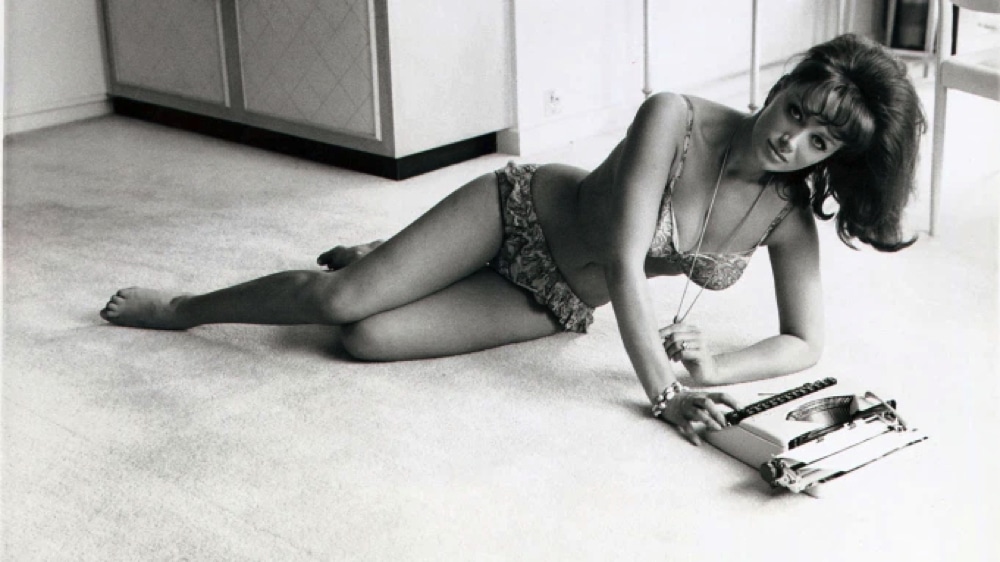




Dir: Laura Fairrie | US Doc 96′
Success came to Jackie Collins beyond her wildest dreams. Despite negative vibes from her father and sister, the actress Joan Collins, she proved that women can make in bed – and in board room – coining the aspiration phase “Girls can do anything” and giving women supreme sexually agency to enjoy their own escapist fantasies not just on the page but on top of the sheets – or anywhere they chose.
This warm and witty portrait of the best-selling author -who books have sold more than 500 million copies worldwide – shows how steely determination and iron resolve eventually made her the toast of Hollywood, sending her rocketing into stardom in the 1990s with a string of raunchy chic-lit page-turners mostly centred on the “dangerously beautiful” sexually liberated Italian-American femme fatale Lucky Santangelo, the character in her most successful paperback ‘Hollywood Wives’. Jackie was also the self-styled author of her own life and chic outward persona. Guarding a secret world behind her well-penned pages, she remained positive in the face of multiple setbacks not least the suicide of her first husband Wallace Austin while her mother was dying of cancer. She would follow in 2015.
Growing up in leafy Hampstead the daughter of a Jewish showbiz agent Jo Collins and his Christian stay at home wife, family played a major part in Jackie’s life, according to director Laura Fairrie. The youngest of three children – her older brother and sister provide informative ballast along with her three voluable daughters and a clutch of close friends and colleagues (amongst them Tita Cahn, wife of Sammy). According to her big sister Joan – who frequently damns her with faint praise – Jackie was always quietly scribbling away in a diary as they enjoyed a glamorous party scene where she joined Joan in late 1950s Hollywood, and these notes would form the basis of her characters, Lucky was the one she aspired to most.
Jackie Collins’ paperbacks were the first to have shiny, gold-embossed covers (now so commonplace in airport booksellers) setting them apart from the usual fare, they looked glamorous and enticing. And while Fairrie’s film is rich in the ruminations of friends and family, what jumps out ahead of the crowd are the startling double-standards at play at the time (and nothing has really changed). Women claim – by the sheer number of books sold – to enjoy the sexually-charged escapes that would later feature in films like The Stud (Joan neatly writing herself into the picture as the main star, as her own career flagged). But on-stage Q&As show the complete opposite, with women castigating her openly with their comments: one opines: “your books are absolute filth”. To her credit Jackie is seen listening thoughtfully, never coming over as strident or outspoken, always perfectly poised and graceful. One amusing sequence sees hackneyed romantic novelist Barbara Cartland having a pop at Jackie, who looks on incredulously. Another less appealing scene shows how Jackie was mercilessly set up on a British chat show with an audience populated by puritanical prudes.
Although Jackie never made it into acting the film shows how she used her experiences observing the Los Angeles celebrity circus and it was Lerman who encouraged her to finish her first book, The World is Full of Married Men, and agreeing to move the family to Los Angeles when Collins set out to crack the American market.In her own coterie of Hollywood jet-setters: Roger Moore is curiously seen making obscene gestures behind Jackie’s back during a drinks soiree but her second marriage to Tramp owner Oscar Lerman proved to be happy, fulfilling and supportive, paving the way to sealing her success in Hollywood.
The success story is only marred by Jackie’s own tragedy that she seems to have kept to herself and suddenly looms up from nowhere, according to her daughter Tara, possibly indicating a lack of self esteem at her innermost core, feeding into those early memories of feeling ‘less than’ and “a big fat lump” next to Joan. But
It was both a tireless work ethic and her survival instinct that kept Collins writing through her grief when Lerman died of prostate cancer in 1992. An extended engagement followed, to L.A. businessman Frank Calcagnini, described by her daughters and other intimates as like a gigolo character from one of her novels. “A gambler, a drugger, an alcoholic and an abuser,” is what Tita Cahn calls him. His death from a brain tumor nonetheless was another blow. When Collins herself was diagnosed with stage 4 breast cancer, she took a leaf out of the book of her father, who decades earlier had responded to her beloved mother’s cancer diagnosis by declaring: “We don’t use that word.”
The film’s account of Jackie’s final weeks, when she kept her illness almost entirely to herself, is quite affecting. There’s poignancy in Joan’s recollections, as well as those of business manager Laura Lizer, of a lunch at the Ritz Carlton where Jackie informed her sister of her condition. During that farewell trip home to London, she also appeared on an ITV chat show, looking gaunt but still full of spirit, just days before her death. She went out promoting her work and keeping her sorrows private.
Fairrie doesn’t attempt to rewrite history and make a case for Collins as an underappreciated literary genius. But she paints a stirring picture of a gifted storyteller and a brilliant female entrepreneur, who shrugged off the cultural snobbery and the misogynistic backlash sparked by her “scandalous” work and laughed all the way to the bank.
hanging out with Michael Caine and Sean Connery and making her friends with the powerful wives of studio bosses such as Barbara Davis and Tita Cahn who refer to her as “their best friend”. MT
Tribeca Film Festival | New York | JUNE 2021
https://www.youtube.com/watch?v=YEOija16ns4